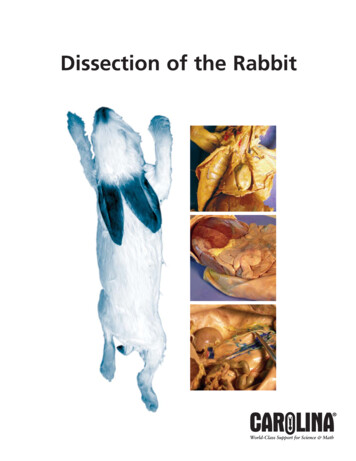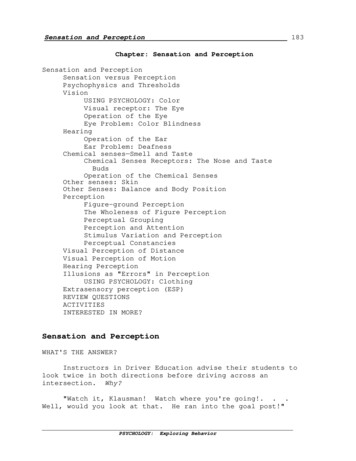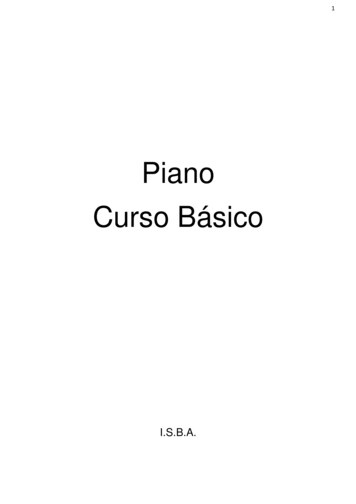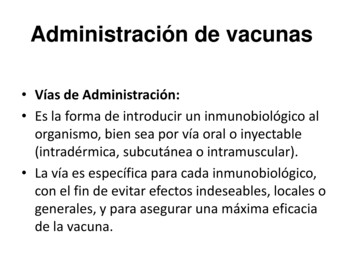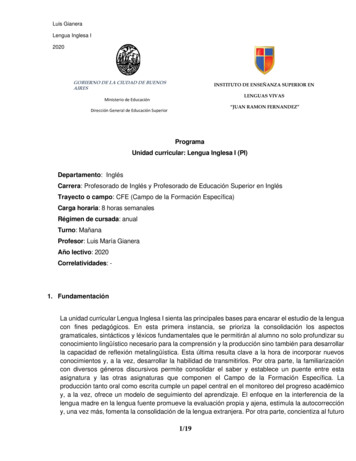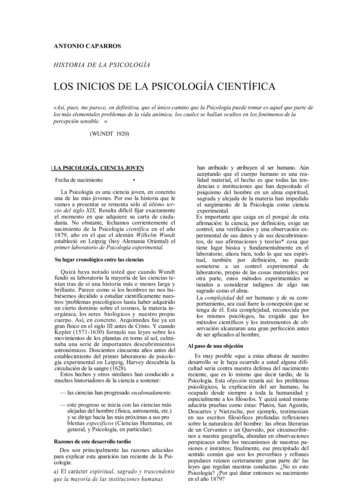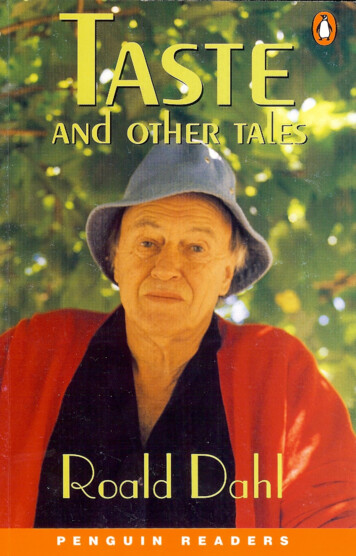
Transcription
Tasteand Other TalesROALD DAHLLevel 5Selected and retold by Michael CaldonSeries Editors: Andy Hopkins and Jocelyn Potter
Pearson Education LimitedEdinburgh Gate, Harlow,Essex CM20 2JE, Englandand Associated Companies throughout the world.ISBN-10: 0-582-41943-3ISBN-13: 978-0-582-41943-8First published in the Longman Simplified English Series 1979in association with Michael Joseph Ltd.First published in Longman Fiction 1993This adaptation first published in 1996This edition first published 19999 10NEW EDITIONThe stories contained in this edition are published internationally,in translation, by the following publishers: Gallimard in France,Rowohlt in Germany, Meulenhoff in The Netherlands, Hayakawa in Japan,Trebi in Sweden and Gyldendal in Denmark.This edition copyright Penguin Books Ltd 1999Cover design by Bender Richardson WhiteSet in ll/14pt BemboPrinted in ChinaSWTC/09For a complete list of titles available in the Penguin Readers series please write to your localPearson Education office or contact: Penguin Readers Marketing Department,Pearson Education, Edinburgh Gate, Harlow, Essex, CM20 2JE.ContentspageIntroductionVTaste1A Swim14Mrs Bixby and the Colonel's Coat25The Way up to Heaven40The Sound Machine54The Leg of Lamb67Birth and Fate78Poison86Activities97
IntroductionThese strange and unusual stories were written by a man who isone of the most popular storytellers of our time. Roald Dahl wasborn in South Wales in 1916 to Norwegian parents, and his earlylife was overshadowed by sad events: his sister and his father diedwithin a few weeks of each other when he was very young. Hewas educated at a boarding school for boys, but he did not fit ineasily with the life of the school and had a very unhappy time. Asa result of his experiences there, some of the stories he wrote laterfeature characters who are cruel to those who have been cruel tothem.After leaving school, Dahl went to work for the Shell OilCompany in London and in Africa, and when the Second WorldWar started he joined the Royal Air Force. He served as a fighterpilot in North Africa, where he was badly injured in a planecrash, and then in Greece and Syria. In 1942 he accepted a postas a British military official in Washington, and it was here that hebegan to have some success as a writer. He succeeded in selling anumber of stories based on his wartime flying adventures to anewspaper called the Saturday Evening Post, and after the warended he became increasingly known as a writer.In 1953 Dahl married the American actress Patricia Neal,with whom he had one son and four daughters. Many of his bestbooks for young people grew out of stories that he invented forhis children at bedtime. But Dahl's life was still clouded by familymisfortune: one of his daughters died when she was seven yearsold, and his wife was very ill while the children were young. In1983 his marriage to Patricia ended, and he married Felicity AnnCrosland. Dahl died in 1990 at the age of seventy-four.Over to You (1946) was Dahl's first collection of stories, basedv
on his years as a pilot. Other collections for adults which achievedwide popularity include Someone Like You (1953), Kiss, Kiss (1960)and Switch Bitch (1974). A number of these stories were rewrittenfor television as Tales of the Unexpected. It is the development ofthe action rather than that of the characters that is central toDahl's writing, and his stories are characterized by the presenceof an unusual twist at the end. He admitted that he found itincreasingly hard to find new ideas for his adult fiction, and thiswas when he began to write for children. He had great successwith his young readers, who love Dahl's dark humour and thesense that his characters can make anything happen if they wantit enough. Many adults, among them parents, teachers andlibrarians, have voiced objections to what they consider to be badmanners and violence in Dahl's books, but children do not seemto share these worries.Dahl wrote nineteen children's books in all. The first was Jamesand the Giant Peach (1961), in which a boy crosses the AtlanticOcean inside a large piece of fruit, together with some very biginsects. While on a tour of a magical and mysterious chocolatefactory in Charlie and the Chocolate Factory (1964), Charlie seesfour unpleasant children disappear. This book became a bestseller as soon as it appeared and was made into a very successfulfilm in 1971. Many of the children's stories present ugly andunpleasant characters to whom unpleasant things happen. George'sMarvellous Medicine (1981) is about a boy who has a mean, unkindgrandmother; in return for her unkindness, he gives her amedicine which does strange and terrible things to her. Childrenlove Revolting Rhymes (1982), in which traditional stories areretold as poems in amusing ways.life and schooldays, and Going Solo (1986), in which he describeshis flying days. Dahl has won many prizes for his writing over theyears, and his work continues to be popular with children andadults all over the world.All the stories in this book have wonderfully inventive story lineswith a twist in the tail. The characters are ordinary andrespectable on the surface, but many of them have anunexpectedly dark and cruel side to their personality. Tension isbuilt up around the relationships between the various characters.Often a husband and wife are involved in mind games in whichtheir hatred for each other is rarely mentioned or acted on untilit has built up to an unbearable level.A harmless guessing game between two lovers of good winesuddenly becomes deadly serious, while a competition on boarda ship has an even more serious result for one of the competitors.Mrs Bixby is faced with a difficult problem when her lover givesher an expensive gift, and Mrs Foster's terrible fear of being lateis cruelly used by her husband. And what are the frighteningsounds that Klausner can hear on the strange machine he hasbuilt? These situations, and more, develop in unexpected ways inthis excellent collection of Dahl's finest stories.Dahl also wrote for the cinema, including the screenplay forYou Only Live Twice (1967) and Chitty Chitty Bang Bang (1968).Parts of his own life story are told in Boy (1984), about his earlyvivii
TasteThere were six of us at dinner that night at Mike Schofield'shouse in London: Mike and his wife and daughter, my wife andI, and a man called Richard Pratt.Richard Pratt was famous for his love of food and wine. Hewas president of a small society known as the Epicures, and eachmonth he sent privately to its members information about foodand wines. He organized dinners where wonderful dishes andrare wines were served. He refused to smoke for fear of harminghis ability to taste, and when discussing a wine, he had a strangehabit of describing it as if it were a living being. 'A sensible wine,'he would say, 'rather shy but quite sensible.' Or, 'A goodhumoured wine, kind and cheerful - slightly rude perhaps, butstill good-natured.'I had been to dinner at Mike's twice before when RichardPratt was there, and on each occasion Mike and his wife hadcooked a very special meal for the famous epicure. And this one,clearly, was to be no exception. The yellow roses on the diningtable, the quantity of shining silver, the three wine glasses to eachperson and, above all, the faint smell of roasting meat from thekitchen brought on a strong desire for the immediate satisfactionof my hunger.As we sat down, I remembered that on both Richard Pratt'slast visits Mike had played a little betting game with him over theclaret. He had asked him to name it and to guess its age. Pratt hadreplied that that should not be too difficult if it was one of thegreat years. Mike had then bet him a case of that same wine thathe could not do it. Pratt had accepted, and had won both times.Tonight I felt sure that the little game would be played again,since Mike was quite ready to lose the bet to prove that his wine1
was good enough to be recognized, and Pratt seemed to takepleasure in showing his knowledge.The meal began with a plate of fish, fried in butter, and to gowith it there was a Mosel wine. Mike got up and poured the winehimself, and when he sat down again, I could see that he waswatching Richard Pratt. He had set the bottle in front of me sothat I could read its name. It said,'Geierslay Ohligsberg 1945'. Heleaned over and whispered to me that Geierslay was a smallvillage in the Mosel area, almost unknown outside Germany. Hesaid that this wine we were drinking was something unusual, andthat so little of this wine was produced that it was almostimpossible for a stranger to get any of it. He had visited Geierslaypersonally the summer before in order to obtain the few bottlesthat they had allowed him to have.'I doubt whether anyone else in the country has any of it atthe moment,' he said.I saw him look again at Richard Pratt. 'The great thing aboutMosel,' he continued, raising his voice,'is that it's the perfect wineto serve before a claret. A lot of people serve a Rhine wineinstead, but that's because they don't know any better.'Mike Schofield was a man who had become very rich veryquickly and now also wanted to be considered someone whounderstood and enjoyed the good things in life.'An attractive little wine, don't you think?' he added. He wasstill watching Richard Pratt. I could see him give a quick lookdown the table each time he dropped his head to take a mouthfulof fish. I could almost feel him waiting for the moment whenPratt would drink his first drop, and look up from his glass witha smile of pleasure, perhaps even of surprise, and then there wouldbe a discussion and Mike would tell him about the village ofGeierslay.But Richard Pratt did not taste his wine. He was too deep inconversation with Mike's eighteen-year-old daughter, Louise. Hewas half turned towards her, smiling at her, telling her, as far as Icould hear, some story about a cook in a Paris restaurant. As hespoke, he leaned closer and closer to her, and the poor girl leanedas far as she could away from him, smiling politely and lookingnot at his face but at the top button of his dinner jacket.We finished our fish, and the servant came round and tookaway the plates. When she came to Pratt, she saw that he had notyet touched his food, so she waited, and Pratt noticed her. Hequickly began to eat, pushing the pieces of fish into his mouthwith rapid movements of his fork. Then, when he had finished,he reached for his glass, and in two short swallows he poured thewine down his throat and turned immediately to continue hisconversation with Louise Schofield.Mike saw it all. I was conscious of him sitting there, very still,looking at his guest. His round, cheerful face seemed to loosenslightly, but he controlled himself and said nothing.Soon the servant came forward with the second course. Thiswas a large joint of roast meat. She placed it on the table in frontof Mike, who stood up and cut it very thinly, laying the piecesgently on the plates for her to take to the guests. When everyonehad been served, he put down the knife and leaned forward withboth hands on the edge of the table.'Now,' he said, speaking to all of us but looking at RichardPratt. 'Now for the claret. I must go and get it, if you'll excuse me.''Get it?' I said. 'Where is it?''In my study, already open; it's breathing.''Why the study?''It's the best place in the house for a wine to reach roomtemperature. Richard helped me to choose it last time he washere.'At the sound of his name, Richard looked round.'That's right, isn't it?' Mike said.'Yes,' Pratt answered seriously. 'That's right.'23
'On top of the green cupboard in my study,' Mike said. 'That'sthe place we chose. A good spot in a room with an eventemperature. Excuse me now, will you, while I get it.'The thought of another wine to play with had cheered himup, and he hurried out of the door. He returned a minute latermore slowly, walking softly, holding in both hands a wine basketin which a dark bottle lay with the name out of sight, facingdownwards. 'Now!' he cried as he came towards the table. 'Whatabout this one, Richard? You'll never name this one!'Richard Pratt turned slowly and looked up at Mike, then hiseyes travelled down to the bottle in its small basket. He stuck outhis wet lower lip, suddenly proud and ugly.'You'll never get it,' Mike said. 'Not in a hundred years.''A claret?' Richard Pratt said, rather rudely.'Of course.''I suppose, then, that not much of this particular claret isproduced?''Perhaps it is, Richard. And perhaps it isn't.''But it's a good year? One of the great years?''Yes, I can promise that.''Then it shouldn't be too difficult,' Richard Pratt said, speakingslowly, looking extremely bored. But to me there was somethingstrange about his way of speaking; between the eyes there was ashadow of something evil, and this gave me a faint sense ofdiscomfort as I watched him.'This one is really rather difficult,' Mike said. 'I won't force youto bet on this one.''Really. And why not?''Because it's difficult.''That's rather an insult to me, you know.''My dear man,' Mike said, 'I'll have a bet on it with pleasure, ifthat's what you wish.''It shouldn't be too hard to name it.''You mean you want to bet?'I'm perfectly ready to bet,' Richard Pratt said.'All right, then, we'll bet the usual. A case of the wine itself'You don't think I'll be able to name it, do you?''As a matter of fact, and with respect, I don't,' Mike said. Hewas trying to remain polite, but Pratt was making little attempt tohide his low opinion of the whole business. Strangely, though, hisnext question seemed to show a certain interest.'Would you like to increase the bet?''No, Richard. A case is enough.''Would you like to bet fifty cases?''That would be silly.'Mike stood very still behind his chair at the head of the table,carefully holding the bottle in its basket. There was a whitenessabout his nose now and his mouth was shut very tightly.Pratt was sitting back in his chair, looking up at Mike. His eyeswere half closed, and a little smile touched the corners of his lips.And again I saw, or thought I saw, something very evil about theman's face.'So you don't want to increase the bet?''As far as I'm concerned, I don't care,' Mike said. 'I'll bet youanything you like.'The three women and I sat quietly, watching the two men.Mike's wife was becoming annoyed; I felt that at any moment shewas going to interrupt. Our meat lay in front of us on our plates,slowly steaming.'So you'll bet me anything I like?''That's what I told you. I'll bet you anything you like.''Even ten thousand pounds?''Certainly I will, if that's the way you want it.' Mike was moreconfident now. He knew quite well that he could afford any sumthat Pratt mentioned.'So you say that I can name the bet?' Pratt asked again.45
'That's what I said.'There was a pause while Pratt looked slowly round the table,first at me, then at the three women, each in turn. He seemed tobe reminding us that we were witnesses to the offer.'Mike!' Mrs Schofield said. 'Mike, why don't we stop thisnonsense and eat our food. It's getting cold.''But it isn't nonsense,' Pratt told her calmly. 'We're making alittle bet.'I noticed the servant standing at the back of the room, holdinga dish of vegetables, wondering whether to come forward withthem or not.'All right, then,' Pratt said. 'I'll tell you what I want you to bet.''Tell me then,' Mike said. 'I don't care what it is. I'll bet.'Again the little smile moved the corners of Pratt's lips, andthen, quite slowly, looking at Mike all the time, he said, 'I wantyou to bet me the hand of your daughter in marriage.'Louise Schofield gave a jump. 'Hey!' she cried. 'No! That's notfunny! Look here, Daddy, that's not funny at all.''No, dear,' her mother said. 'They're only joking.''I'm not joking,' Richard Pratt said.'It's stupid,' Mike said. Once again, he was not in control of thesituation.'You said you'd bet anything I liked.''I meant money.''You didn't say money.''That's what I meant.''Then it's a pity you didn't say it. But, if you wish to take backyour offer, that's quite all right with me.''It's not a question of taking back my offer, old man. It's not aproper bet because you haven't got a daughter to offer me in caseyou lose. And if you had, I wouldn't want to marry her.''I'm glad of that, dear,' his wife said.'I'll offer anything you like,' Pratt announced. 'My house, forexample. How about my house?''Which one?' Mike asked, joking now.'The country one.''Why not the other one as well?''All right, then, if you wish it. Both my houses.'At that point I saw Mike pause. He took a step forward andplaced the bottle in its basket gently down on the table. Hisdaughter, too, had seen him pause.'Now, Daddy!' she cried. 'Don't be stupid! It's all too silly forwords. I refuse to be betted on like this.''Quite right, dear,' her mother said. 'Stop it immediately Mike,and sit down and eat your food.'Mike ignored her. He looked over at his daughter and hesmiled, a slow, fatherly, protective smile. But in his eyes, suddenly,shone the faint light of victory. 'You know,' he said, smiling as hespoke, 'you know, Louise, we ought to think about this a bit.''Now stop it, Daddy! I refuse even to listen to you! Why, I'venever heard anything so crazy in all my life!''No, seriously, my dear. Just wait a moment and hear what Ihave to say.''But I don't want to hear it.''Louise, please! It's like this. Richard, here, has offered us aserious bet. He is the one who wants to make it, not me. And ifhe loses, he will have to hand over a large amount of property.Now wait a minute, my dear, don't interrupt. The point is this. Hecannot possibly win.''He seems to think he can.''Now listen to me, because I know what I'm talking about.The claret I've got here comes from a very small wine-growingarea that is surrounded by many other small areas that producedifferent varieties of wine. He'll never get it. It's impossible.''You can't be sure of that,' his daughter said.'I'm telling you I can. Though I say it myself, I understand67
quite a bit about this wine business, you know. Heavens, girl, I'myour father and you don't think I'd make you do - do somethingyou didn't want to do, do you? I'm trying to make you somemoney.''Mike!' his wife said sharply. 'Stop it now, Mike, please!'Again, he ignored her. 'If you will take this bet,' he said to hisdaughter,'in ten minutes you'll be the owner of two large houses.''But I don't want two large houses, Daddy.''Then sell them. Sell them back to him immediately. I'llarrange all that for you. And then, just think of it, my dear, you'llbe rich! You'll be independent for the rest of your life!''Oh, Daddy, I don't like it. I think it's silly.''So do I,' the mother said. 'You ought to be ashamed ofyourself, Michael, for even suggesting such a thing! Your owndaughter, too!'Mike did not look at her. 'Take it!' he said eagerly, looking hardat the girl. 'Take it, quickly! I promise you won't lose.''But I don't like it, Daddy.''Come on, girl. Take it!'Mike was pushing her hard. He was leaning towards her, andfixing her with two bright, determined eyes, and it was not easyfor his daughter to refuse him.'But what if I lose?''I keep telling you, you can't lose.''Oh, Daddy, must I?''I'm making you a fortune. So come on now. What do you say,Louise? All right?'For the last time, she paused. Then she gave a helpless littlemovement of the shoulders and said, 'Oh, all right, then. Just solong as you swear there's no danger of losing.''Good!' Mike cried. 'That's fine! Then it's a bet!''Yes,' Richard Pratt said, looking at the girl. 'It's a bet.'Immediately, Mike picked up the wine and walked excitedlyround the table, filling up everybody's glasses. Now everybodywas watching Richard Pratt, watching his face as he reachedslowly for his glass with his right hand and lifted it to his nose.The man was about fifty years old and he did not have a pleasantface. Somehow, it was all mouth — mouth and lips — the full, wetlips of the professional epicure. The lower lip hung down in thecentre, a permanently open taster's lip. Like a keyhole, I thought,watching it; his mouth is like a large wet keyhole.Slowly he lifted the glass to his nose. The point of his noseentered the glass and moved over the surface of the wine. Hemoved the wine gently around in the glass to smell it better. Heclosed his eyes, and now the whole top half of his body, the headand neck and chest, seemed to become a kind of large sensitivesmelling-machine.Mike, I noticed, was sitting back in his chair, trying to appearunconcerned, but he was watching every movement. MrsSchofield, the wife, sat upright at the other end of the table,looking straight ahead, her face tight with disapproval. Thedaughter, Louise, had moved her chair away a little and sideways,facing the epicure, and she, like her father, was watching closely.For at least a minute, the smelling process continued; then,without opening his eyes or moving his head, Pratt lowered theglass to his mouth and poured in almost half the wine. He paused,his mouth full, getting the first taste. And now, withoutswallowing, he took in through his lips a thin breath of air whichmixed with the wine in the mouth and passed on down into hislungs. He held his breath, blew it out through his nose, and finallybegan to roll the wine around under his tongue.It was an impressive performance.Urn,' he said, putting down the glass, moving a pink tongueover his lips. 'Um — yes. A very interesting little wine - gentle andgraceful. We can start by saying what it is not. You will pardon mefor doing this carefully, but there is much to lose. Usually I would89
perhaps take a bit of a chance, but this time I must move carefully,must I not?' He looked up at Mike and he smiled, a thick-lipped,wet-lipped smile. Mike did not smile back.'First, then, which area of Bordeaux does this wine comefrom? That's not too difficult to guess. It's far too light to be fromeither St Emilion or Graves. It's obviously a Medoc. There's nodoubt about that. Now, from which part of Medoc does it come?That should not be too difficult to decide. Margaux? No, itcannot be Margaux. Pauillac? It cannot be Pauillac, either. It is toogentle for Pauillac. No, no, this is a very gentle wine.Unmistakably this is a St Julien.'He leaned back in his chair and placed his fingers carefullytogether. I found myself waiting rather anxiously for him to goon. The girl, Louise, was lighting a cigarette. Pratt heard the matchstrike and he turned on her, suddenly very angry. 'Please!' he said.'Please don't do that! It's a terrible habit, to smoke at table!'She looked up at him, slowly and disrespectfully, still holdingthe burning match in one hand. She blew out the match, butcontinued to hold the unlighted cigarette in her fingers.'I'm sorry, my dear,' Pratt said, 'but I simply cannot havesmoking at table.'She didn't look at him again.'Now, let me see — where were we?' he said. 'Ah yes. This wineis from Bordeaux, from St Julien, in the area of Medoc. So far, sogood. But now we come to the more difficult part - the name ofthe producer. For in St Julien there are so many, and as our hostso rightly remarked, there is often not much difference betweenthe wine of one and the wine of another. But we shall see.'He picked up his glass and took another small drink.'Yes,' he said, sucking his lips, 'I was right. Now I am sure of it.It's from a very good year - from a great year, in fact. That's better!Now we are closing in! Who are the wine producers in the areaof St Julien?'Again he paused. He took up his glass. Then I saw his tongueshoot out, pink and narrow, the end of it reaching into the wine.A horrible sight. When he lowered his glass, his eyes remainedclosed. Only his lips were moving, sliding over each other liketwo pieces of wet rubber.'There it is again!' he cried. 'Something in the middle taste. Yes,yes, of course! Now I have it! The wine comes from aroundBeychevelle. I remember now. The Beychevelle area, and the riverand the little port. Could it actually be Beychevelle itself? No, Idon't think so. Not quite. But it is somewhere very close. Talbot?Could it be Talbot? Yes, it could. Wait one moment.'He drank a little more wine, and out of the corner of my eyeI noticed Mike Schofield and how he was leaning further andfurther forward over the table, his mouth slightly open, his smalleyes fixed on Richard Pratt.'No, I was wrong. It is not a Talbot. A Talbot comes forward toyou just a little more quickly than this one; the fruit is nearer thesurface. If it is a '34, which I believe it is, then it couldn't be aTalbot. Well, well, let me think. It is not a Beychevelle and it isnot a Talbot, but — but it is so close to both of them, so close, thatit must be from somewhere almost in between. Now, whichcould that be?'He was silent, and we waited, watching his face. Everyone,even Mike's wife, was watching him now. I heard the servant putdown the dish of vegetables on a table behind me, gently, so asnot to break the silence.'Ah!' he cried. 'I have it! Yes, I think I have it!'For the last time, he drank some wine. Then, still holding theglass up near his mouth, he turned to Mike and he smiled, a slow,silky smile, and he said, 'You know what this is? This is the littleChateau Branaire-Ducru.'Mike sat tight, not moving.'And the year, 1934.'1011
We all looked at Mike, waiting for him to turn the bottlearound in its basket.'Is that your final answer?' Mike said.'Yes, I think so.''Well, is it, or isn't it?''Yes, it is.''What was the name again?''Chateau Branaire-Ducru. Pretty little farm. Lovely old house.I know it quite well. I can't think why I didn't recognize itimmediately.''Come on, Daddy,' the girl said. 'Turn the bottle round and let'shave a look. I want my two houses.''Just a minute,' Mike said. 'Wait just a minute.' He was sittingvery quiet, and his face was becoming pale, as though all the forcewas flowing slowly out of him.'Michael!' his wife called out sharply from the other end of thetable. 'What's the matter?''Keep out of this, Margaret, will you please.'Richard Pratt was looking at Mike, smiling with his mouth, hiseyes small and bright. Mike was not looking at anyone.'Daddy!' the daughter cried. 'You don't mean to say he guessedit right!''Now, stop worrying, my dear,' Mike said. 'There's nothing toworry about.'I think it was more to get away from his family than anythingelse that Mike then turned to Richard Pratt and said,'I think youand I had better go into the next room and have a little talk.''I don't want a little talk,' Pratt said. 'All I want is to see thename on that bottle.'He knew he was a winner now and I could see that he wasprepared to become thoroughly nasty if there was any trouble.' W h a t are you waiting for?' he said to Mike. 'Go on and turn itround.'Then this happened: the servant, a small, upright figure in herwhite-and-black uniform, was standing beside Richard Pratt,holding something out in her hand. 'I believe these are yours, sir,'she said.Pratt looked round, saw the pair of glasses that she held out tohim, and for a moment he paused. 'Are they? Perhaps they are, Idon't know.''Yes, sir, they're yours. 'The servant was an old woman — nearerseventy than sixty — a trusted employee of the family for manyyears. She put the glasses down on the table beside him.Without thanking her, Pratt picked them up and slipped theminto his top pocket.But the servant did not go away. She remained standing besideRichard Pratt, and there was something so unusual in her mannerand in the way she stood there, small, still and upright, that Ifound myself watching her with sudden anxiety. Her old greyface had a cold, determined look.'You left them in Mr Schofield's study,' she said. Her voice wasunnaturally, deliberately polite. 'On top of the green cupboard inhis study, sir, when you happened to go in there by yourselfbefore dinner.'It took a few moments for the full meaning of her words to beunderstood, and in the silence that followed I saw Mike slowlypulling himself up in his chair, and the colour coming to his face,and his eyes opening wide, and the curl of his mouth — and adangerous whiteness beginning to spread around his nose.'Now, Michael!' his wife said. 'Keep calm now, Michael, dear!Keep calm!'1213
At last, a really bad roll came, and Mr William Botibol, sittingat the purser's table, saw his plate of fish sliding suddenly awayfrom under his fork. Everybody, now, was reaching for plates andwine glasses. Mrs Renshaw, seated at the purser's right, gave alittle scream and held onto that gentleman's arm.'It's going to be a rough night,' the purser said, looking at MrsRenshaw. 'I think there's a storm coming that will give us a veryrough night.' There was just the faintest suggestion of pleasure inthe way he said it.Most of the passengers continued with their meal. A smallnumber, including Mrs Renshaw, got carefully to their feet andmade their way between the tables and through the doorway,trying to hide the urgency they felt.'Well,' the purser said, 'there she goes.' He looked round withapproval at the remaining passengers who were sitting quietly,with their faces showing openly that pride that travellers seem totake in being recognized as 'good sailors'.When the eating was finished and the coffee had been served,Mr Botibol, who had been unusually serious and thoughtful sincethe rolling started, suddenly stood up and carried his cup ofcoffee around to Mrs Renshaw's empty place, next to the purser.He seated himself in her chair, then immediately leaned over andbegan to whisper urgently in the purser's ear. 'Excuse me,' he said,'but could you tell me something, please?'The purser, small and fat and red, bent forward to listen.'What's the trouble, Mr Botibol?''What I want to know is this. 'The man's face was anxious andthe purser was watching it. 'What I want to know is: will thecaptain already have made his guess at the day's run - you
wide popularity include Someone Like You (1953), Kiss, Kiss (1960) and Switch Bitch (1974). A number of these stories were rewritten for television as Tales of the Unexpected. It is the development of the action rather than that of the characters that is central to Dahl's w
